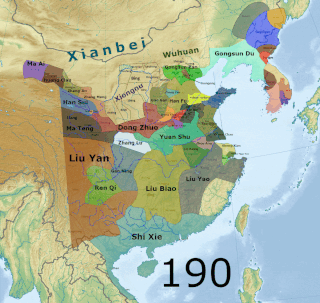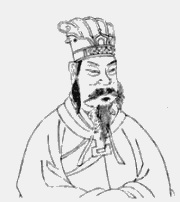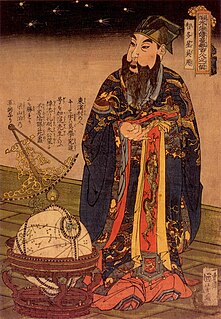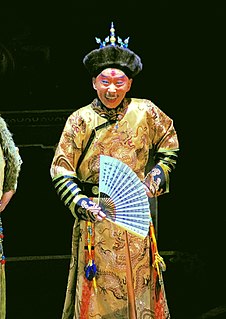Related Research Articles

The Three Kingdoms from 220 to 280 AD was the tripartite division of China among the states of Wei, Shu, and Wu. The Three Kingdoms period started with the end of the Han dynasty and was followed by the Jin dynasty. The short-lived Yan kingdom in the Liaodong Peninsula, which lasted from 237 to 238, is sometimes considered as a "4th kingdom".

Han, known in historiography as Shu Han or Ji Han (季漢), was one of the three major states that competed for supremacy over China in the Three Kingdoms period (220–280). The state was based in the area around present-day Hanzhong, Sichuan, Chongqing, Yunnan, Guizhou, and north Guangxi, an area historically referred to as "Shu" based on the name of the past ancient state of Shu, which also occupied this approximate geographical area. Its core territory also coincided with Liu Bang's Kingdom of Han, the precursor of the Han dynasty.

Wu (222–280), commonly known as Dong Wu or Sun Wu, was one of the three major states that competed for supremacy over China in the Three Kingdoms period (220–280). It previously existed from 220–222 as a vassal kingdom nominally under Cao Wei, its rival state, but declared independence from Wei and became a sovereign state in 222. It became an empire in 229 after its founding ruler, Sun Quan, declared himself emperor. Its name was derived from the place it was based in — the Jiangnan region, which was also historically known as "Wu". It was referred to as "Dong Wu" or "Sun Wu" by historians to distinguish it from other Chinese historical states with similar names which were also located in that region, such as the Wu state in the Spring and Autumn period and the Wuyue kingdom in the Five Dynasties and Ten Kingdoms period. It was called "Eastern Wu" because it occupied most of eastern China in the Three Kingdoms period, and "Sun Wu" because the family name of its rulers was "Sun". During its existence, Wu's capital was at Jianye, but at times it was also at Wuchang.

Emperor Jing of Han, personal name Liu Qi (劉啟), was the sixth emperor of the Chinese Han dynasty from 157 to 141 BC. His reign saw the limiting of the power of the feudal kings/princes which resulted in the Rebellion of the Seven States in 154 BC. Emperor Jing managed to crush the revolt and princes were thereafter denied rights to appoint ministers for their fiefs. This move helped to consolidate central power which paved the way for the long reign of his son Emperor Wu of Han.

Emperor Wu of Han, formally enshrined as Emperor Wu the Filial, born Liu Che (劉徹) and courtesy name Tong (通), was the seventh emperor of the Han dynasty of ancient China, ruling from 141 to 87 BC. His reign lasted 54 years — a record not broken until the reign of the Kangxi Emperor more than 1,800 years later and remains the record for ethnic Chinese emperors. His reign resulted in a vast expansion of geopolitical influence for the Chinese civilization, and the development of a strong centralized state via governmental policies, economical reorganization and promotion of a hybrid Legalist-Confucian doctrine. In the field of historical social and cultural studies, Emperor Wu is known for his religious innovations and patronage of the poetic and musical arts, including development of the Imperial Music Bureau into a prestigious entity. It was also during his reign that cultural contact with western Eurasia was greatly increased, directly and indirectly.

The Rebellion of the Seven States or Revolt of the Seven Kingdoms took place in 154 BC against China's Han dynasty by its regional semi-autonomous kings, to resist the emperor's attempt to centralize the government further.

Wu Yong is a fictional character in Water Margin, one of the Four Great Classical Novels in Chinese literature. Nicknamed "Knowledgeable Star", he ranks third among the 36 Heavenly Spirits, the first third of the 108 Stars of Destiny.

The China Theatre Plum Blossom Award, more commonly the Plum Blossom Award, is the highest theatrical award in China. It is awarded by the China Theatre Association.

Liu Zhang, courtesy name Jiyu, was a warlord and provincial governor who lived in the late Eastern Han dynasty of China. He became the Governor of Yi Province, succeeding his father Liu Yan and ruled the region until 214, when he surrendered to Liu Bei. Six years later, Liu Zhang again surrendered to Eastern Wu, and died shortly afterwards. Liu Zhang is often considered an incapable leader but is noted to have been the original lord of some of Shu Han's most famous generals and officials such as Fa Zheng, Meng Da, Yan Yan, Liu Ba, Huang Quan, Wu Yi, Li Yan, Dong He and others.
Liu Yuan (劉淵), courtesy name Yuanhai (元海), formally Emperor Guangwen of Han (Zhao) was the founding emperor of the Xiongnu state Han Zhao in 308.

Nicholas Wu Qilong is a Taiwanese singer and actor. He found fame in 1988 when he became a member of the popular Taiwanese band, Xiao Hu Dui, performing alongside Alec Su and Julian Chen. The trio were extremely successful in Taiwan, selling over 15 million albums. During his time with Little Tigers Team, he pursued a solo career, releasing an extensive catalogue of songs, Mandarin and Cantonese albums as a solo artist when member Julian Chen left the group to serve compulsory military service. Wu released his debut solo album in 1992.

Amblyseius is a large genus of predatory mites belonging to the family Phytoseiidae. Many members of this genus feed on other mites such as red spider mites, and also on thrips. Several species are popular as biological control agents to control these pests.
The Politics of Henan Province in the People's Republic of China is structured in a dual party-government system like all other governing institutions in mainland China.

The China women's national volleyball team represents the People's Republic of China in international volleyball competitions and friendly matches governed by Chinese Volleyball Association. They are one of the leading and most successful squads in women's international volleyball, having won ten championships titles in the three major international competitions of volleyball, including five World Cups, two World Championships and three Olympic titles. The current head coach is Lang Ping.

Lecithocera is a genus of moths in the lecithocerid subfamily Lecithocerinae. The genus was erected by Gottlieb August Wilhelm Herrich-Schäffer in 1853.

The Book and the Sword is a Taiwanese television series adapted from Louis Cha's novel of the same title. The series was first broadcast on CTS in Taiwan in 1992.
Wu Yi courtesy name Ziyuan was a general of the state of Shu Han in the Three Kingdoms period of China. His younger sister, Empress Mu, was the empress consort of Shu's founding emperor, Liu Bei. Wu Yi had a younger relative, Wu Ban, who also served as a general in Shu.
Carodista flavicana is a moth in the family Lecithoceridae. It was described by Chun-Sheng Wu in 2003. It is found in Guizhou, China.
Opacoptera ecbasta is a moth in the family Lecithoceridae. It was described by Chun-Sheng Wu in 1996. It is found in China.
References
- ↑ Savela, Markku. "Opacoptera flavicana Wu & Liu, 1992". Lepidoptera and Some Other Life Forms. Retrieved January 23, 2018.
| This article on a moth of the family Lecithoceridae is a stub. You can help Wikipedia by expanding it. |